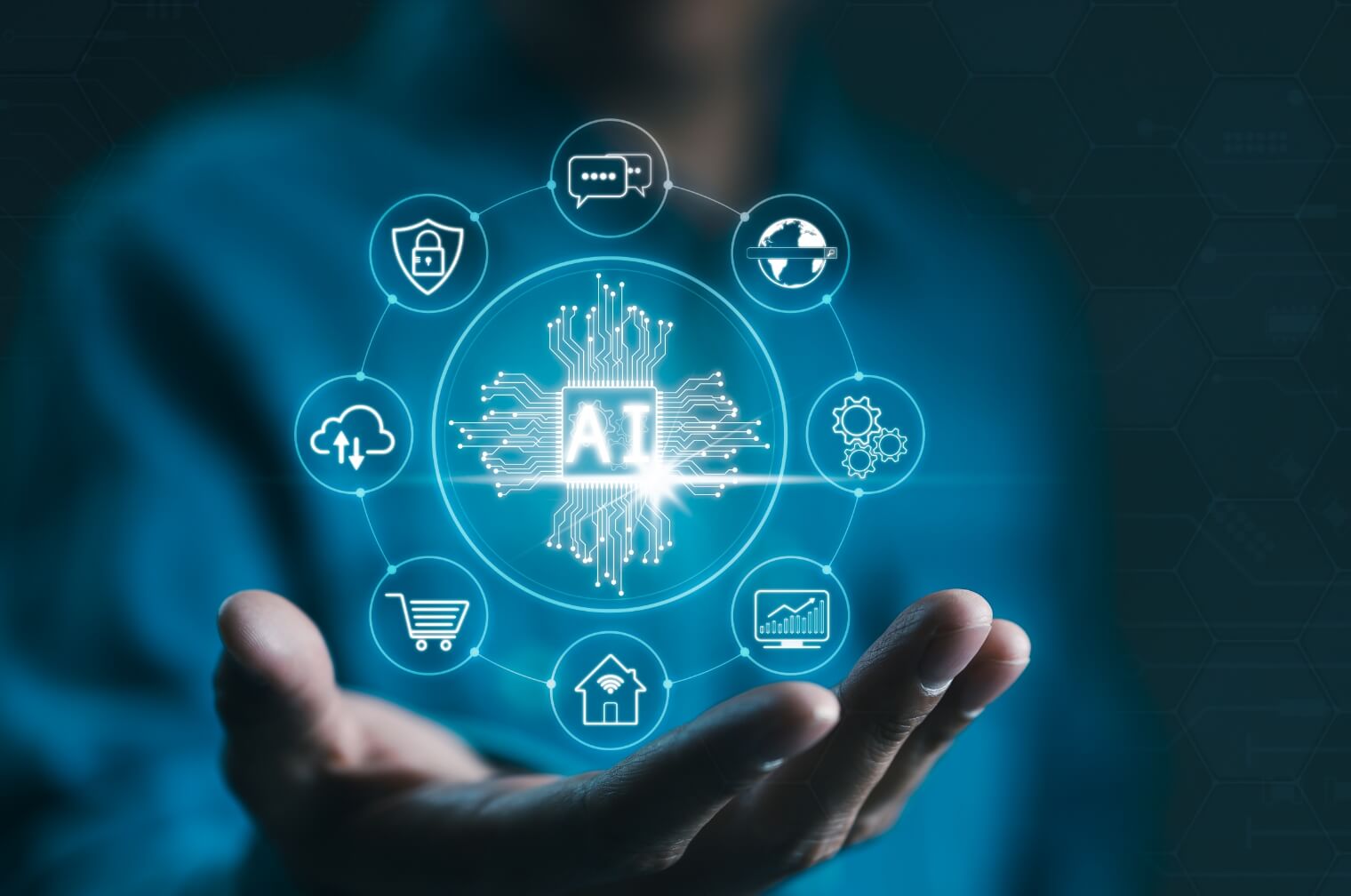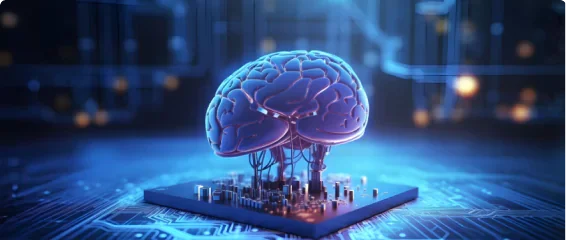Machine Learning and AI for revolution of Tech Companies are changing and streamlining businesses.
In the recent market, managing the IT infrastructure is difficult as numerous applications and databases operate independently. Also, doing the work manually consumes time and increases inefficiency. Artificial Intelligence is helpful in the IT business in overcoming these difficulties and automating manual tasks.
Additionally, AI analyzes the data, provides insights into the business operations, and system, and helps monitor the business performance. As a result, ViitorCloud AI Solution empowers enterprises to optimize operations, increase operation efficiency, and deliver uninterpreted customer support with chatbots.
The integration of AI into IT infrastructure helps in sustainable growth. Let’s dive into how AI impacts the IT industry, the role of Artificial intelligence in information technology, and more information.
Impact of AI on the Information Technology Industry
AI information technology helps solve and optimize the challenges in the IT industry. It enables developers to enhance productivity, improve efficiency, and ensure quality in the IT industry.
However, let’s understand the impact of AI on the IT industry.
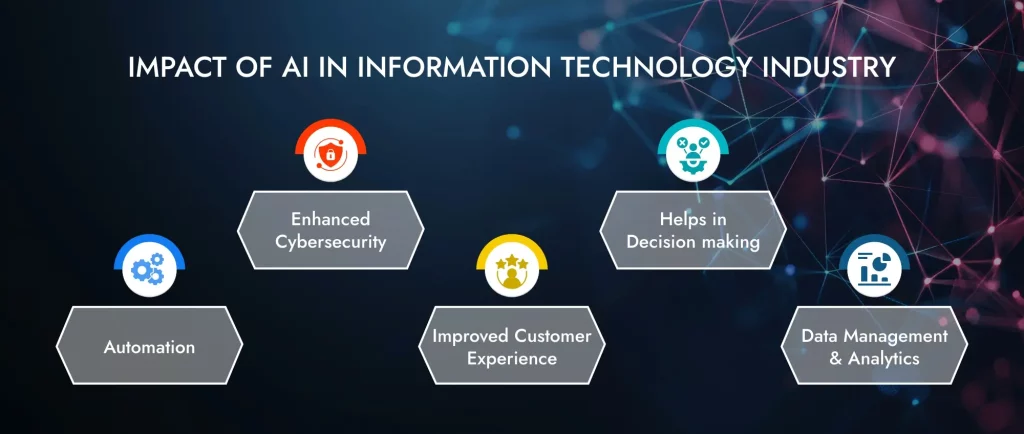
1. Automation
AI in automation is streamlining the operation process in the IT industry. It helps monitor networks, system testing, and system maintenance to automate the work with machine learning and AI algorithms. As a result, there is an improvement in efficiency and a reduction in human errors. Because of this automation, IT professionals can focus on complex strategies and work and grow their businesses.
2. Enhanced Cybersecurity
Cybersecurity threats are attacking the IT industry system, where AI is helping to fight against threats and malicious activities. AI helps as it can detect anomalies, patterns, and vulnerabilities, respond to cybersecurity threats, and protect the data and system.
3. Improved Customer Experience
AI IT solutions are transforming the IT industry with the help of virtual assistants and chatbots. This system helps understand the customer, respond to customer queries, provide personalized assistance, and troubleshoot common issues. The natural language process works as a human being to enhance customer satisfaction and reduce response time for the query.
4. Helps in Decision-making
AI can collect and analyze the data to identify patterns and provide recommendations for decision-making. As a result, IT professionals can make the right decisions regarding resource allocations, strategic planning, and system upgrades. Also, AI predicts failure before it arises, so proactive measures can be taken to avoid failure.
5. Data Management and Analytics
AI algorithms can analyze vast amounts of data in seconds and provide insights humans avoid. Data analytics helps decision-making, provides data-driven strategies, and improves operations efficiency. Additionally, AI solutions predictive analysts optimize the resources, forecast trends, and improve the planning of IT infrastructure to help the IT industry stay ahead of the competition.
READ: Artificial Intelligence in Business: An Intelligent Approach for Digital Transformation
Transform Your IT Infrastructure with AI
How is AI used in information technology?
Using AI in information technology improves efficiency and productivity in operations. Also, it reduces the cost and saves time. Additionally, it helps make decisions by analyzing data.
Let’s understand how to use information technology in AI in detail.
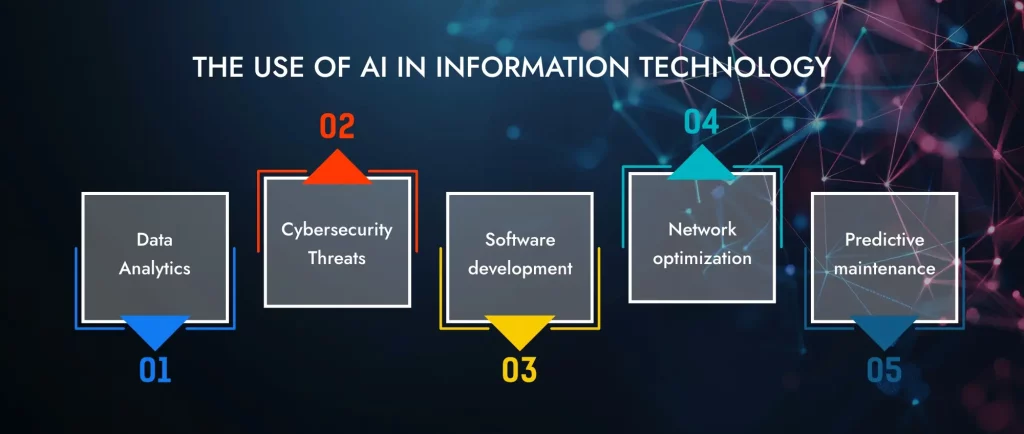
1. Data Analytics
AI can collect large amounts of data, analyze complex data, and uncover trends and patterns. These insights help businesses to make business decisions. Additionally, predictive analytics helps forecast future trends and anticipate customer behavior, market changes, and operation needs. Furthermore, perspective analytics provide actionable strategies to optimize the business process.
In the IT industry, Al assists in automating report generation and data visualization and uncovers deeper insights from past data. As a result, core business people can make the right business decisions.
2. Cybersecurity Threats
AI helps cybersecurity by monitoring network traffic, user behavior, and systems logs to identify anomalies and suspicious activities and identify security risks. It also analyzes large amounts of data to identify malware and emerging threats that go unnoticed with traditional security measures.
After the identified threat, AI provides alerts, automates incident response actions, detaches affected devices, and blocks malicious activities. This approach enhances cybersecurity in organizations by reducing response time, mitigating risks, and safeguarding sensitive data from cyberattacks.
3. Software Development
AI streamlines the code generation process for the repetition of the process. It can analyze patterns in existing codes, automatically generate code snippets, and reduce manual effort for routine programming tasks. As a result, programmers can focus on more complex tasks in the business.
Additionally, AI generates code that promotes adherence to the coding standards. Also, using Artificial intelligence in the information technology industry improves productivity, minimizes errors, and helps software developers deliver high-quality code
4. Network Optimization
Artificial intelligence in IT evaluates user behavior, system performance, and network optimization, allowing organizations to identify and address issues quickly. It helps identify bottlenecks and adjust configuration to improve network performance and user experience and reduce downtime.
Additionally, network optimization with AI improves network reliability and efficiency, improves productivity, and satisfies the user.
5. Predictive Maintenance
AI can analyze large amounts of data and find the issues in the hardware systems. It analyzes data from historical records, sensors, and other sources to predict problems or failures in the hardware systems. The issues or failures include storage devices, servers, or networking equipment.
Additionally, identifying issues helps in the maintenance and replacement of the systems. Also, it prevents unexpected downtime and minimizes issues during the operations. It reduces maintenance and repair costs and provides reliability in the IT industry.
ALSO READ: How to Implement AI in Your Business: 7 Easy Steps
Role of Artificial Intelligence in Information Technology Industries
AI transforms IT industries by automating routine tasks, analyzing data, and solving IT issues. As a result, efficiency is improved, resources are optimized, and operations in information technology work smoothly.
Let’s know in detail the role of artificial intelligence in IT industries
1. Automate Routine Tasks
Automate routine tasks such as system monitoring, software updates, and data backups. Also, AI algorithms and machine learning can predict the failure of AI models to detect anomalies in the system. This automation helps improve operations and efficiency, minimize the downtime of machines, and help in the proper allocation of resources. As a result, business owners can focus on planning and strategic activities.
2. Predictive Analysis
AI analyzes vast data, predicts system failures and customer needs, and optimizes resource allocations and maintenance. As a result, efficiency improves, and costs are reduced. AI helps stay ahead of the competition by providing insights that help improve operations and strategic planning in the IT industry.
3. Advanced System Programming
Advanced system programming in AI develops complex algorithms and frameworks to improve artificial intelligence functions. It combines low-level task systems with high-level AI functions to enhance scalability and performance in the IT industry. Engineers work on parallel computing and kernel-level programming and optimize memory management to solve complex AI models.
SEE: What Are the Top Trends in AI for Businesses?
Enhance IT Operations with AI Innovation
How to Implement AI Solutions in IT?
Implementing AI solutions in IT integrates machine learning and natural language processing to automate tasks, optimize operations, and improve decision-making. Also, it transforms the business through strategic planning and data infrastructure.
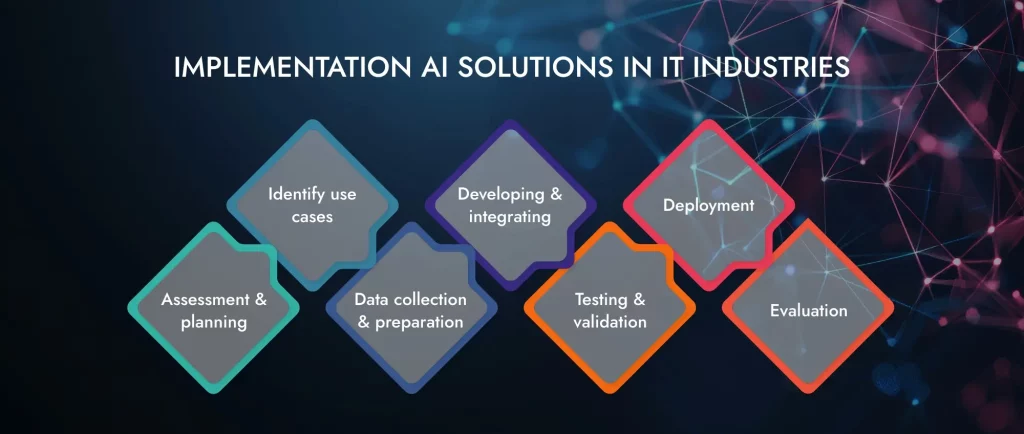
1. Assessment and Planning
You have defined the objective of implementing AI in IT operations. The objectives of the business are improving security, improving efficiency, and optimizing the utilization of resources. This objective helps in planning to implement Artificial intelligence in information technology. Also, the IT infrastructure, such as data quality, team skillsets, and technology, must be evaluated to prepare for AI integration.
2. Identify Use Cases
Identifying the use cases in the IT industry is essential as they give value to the business. It includes tasks like predictive maintenance, automated monitoring, and threat detection in security.
3. Data Collection and Preparation
When you have to implement AI in the business, data collection is essential. The data includes historical data, performance metrics, and other data sources such as AI. Also, clean and preprocess the data to provide quality and reliable data provide excellent input data.
4. Developing and Integrating
Once the data collection is complete, the AI model is developed depending on the selected algorithms. It involves the collaboration of IT professionals and data scientists to build the AI model. Also, AI should be integrated into existing IT systems and workflow to operate the operations system of the IT industry smoothly.
5. Testing and Validation
After developing an AI model and integrating AI into the system, testing the AI model is important. It is important to learn how to work in real-world scenarios so that the environment can be created for testing. Once testing is completed, take the feedback and implement it in the AI model to improve the performance during the testing phase.
6. Deployment
Implement the AI solutions in the business at a smaller scale or in one department; after that, expand to other departments or businesses. When implemented one by one, AI is smoothly implemented in the business, and employees can easily adopt AI. Additionally, monitoring tools can be used to track performance in real time and provide support during the ongoing operation process.
7. Evaluation
After monitoring the performance, evaluate the performance depending on the business objectives and KPIs. If any changes are needed based on performance feedback, implement them, improve the AI system, and optimize the AI systems.
ALSO SEE: AI Business Ideas for Entrepreneurs and Startups
Future of AI in the Information Technology Industry
Artificial intelligence is an important concept of the future. According to the research, the AI market is anticipated to reach $190 billion by 2025. Until 2021, global spending on AI will be $57.6 billion, while 75% of businesses will use AI technology apps.
Let’s understand the future of AI in the information technology industry in detail.
1. More Secure System
Data protection is important in business and government organizations. Companies and governments collect large amounts of data from the public. The data is personal, financial, or confidential. This data needs to be protected. Otherwise, lots of schemes can take place in the market. AI solves data security problems, as it identifies data breaches and threats with the help of AI algorithms and machine learning.
2. Increase Automation
AI automation helps minimize manual work and reduce human interference. Also, AI goes into deep learning applications to automate backend processes in IT, so cost is reduced and human interference is minimized. As a result, the efficiency and productivity of IT businesses improve.
3. Improve Quality Assurance
AI tools help in providing accurate tests related to the testing of applications. Also, AI helps software engineers use the right tools to fix bugs and issues in the application and adjust them automatically during the development cycle. Ultimately, AI optimizes the quality assurance process, improves software reliability, and improves efficiency in the IT industry.
Optimize Your IT Systems with AI Power
How Does Viitorcloud Streamline Your IT Processes?
The information technology industry plays a crucial role in changing the world. AI innovation helps streamline the IT process by automating routine tasks, optimizing operations, personalized user experiences, and improving decision-making. Keeping IT organizations ahead of the competition in the changing technology world is essential.
We, Viitorcloud, an AI development service company, help adopt Artificial intelligence in the information technology business. Our team of experts helps streamline the operation process by integrating AI into your business, as we are a trusted partner in AI technology. Partner with Viitorcloud to implement AI in the business, achieve objectives, and streamline the IT process.
Frequently Asked Questions
The role of Artificial intelligence in information technology helps automate routine tasks, predictive analytics, and advance programming systems. As a result, cost is reduced, improving efficiency and productivity in the IT industry.
AI-powered information technology solutions can detect threats in the systems and protect the system. Also, it helps analyze the data to predict customer behavior, operation needs, market changes, and forecast trends. As a result, AI improves information technology.
AI helps IT to reduce costs by reducing human errors, optimizing resource allocations, optimizing operational expenses, and satisfying the customer.
Natural language processing is used in chatbots to solve customer queries, respond to customers on time, and improve customer service—also, it personalized interactions with the customers.
AI technology is safe when used correctly to ensure the systems are developed and deployed responsibly. Developers must consider ethical rules and privacy concerns when designing AI systems.




